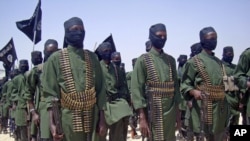Somalia’s Constituent Assembly conference has convened a series of meetings in Mogadishu, bringing together more than 100 traditional elders to decide the selection of the assembly that will adopt a constitution and a new parliament. Some analysts said elders from areas still under the control of al-Shabab and those clans supporting the group may elect members of parliament who favor the Islamist militant group.
Less than three months before Somalia’s Transitional Federal Government is scheduled to come to an end, the government has started the process of convening a constituent assembly, one of several steps aimed at giving the war-torn nation a more permanent central government.
It is expected that the constituent assembly will appoint a new interim authority with the task of establishing the institutions of government and preparing elections.
Abdiwahab Sheikh Abdisamad, a Somalia analyst with Southlink consultants in Nairobi, said elders from al-Shabab-controlled areas will push the militant group's agenda in the assembly.
“They are going to influence the elders, so what they are saying to them is 'Elect so-and-so.' The members of parliament who will be attending the parliament might be someone who is pro-Shabab; that’s one key issue al-Shabab is going to fight for," Abdisamad said. "They [al-Shabab] want to make sure anyone who goes to the parliament must fulfill the policy of al-Shabab.”
The militant group came close to having full control of Mogadishu in 2010, but has since been pushed out of the capital by African Union forces supporting the transitional government. Al-Shabab has also suffered reversals in central Somalia, where the group has fought Ethiopian troops, and in southern Somalia, where Kenyan forces crossed the border last October.
However, the group still controls sections of the country and is still capable of carrying out suicide attacks, giving it some influence over Somalia's affairs.
On Sunday the militia group posted the list of 135 elders attending the conference, their telephone numbers and clans they represent.
Abdisamad said al-Shabab is posting the list to threaten the elders, knowing the power to elect lawmakers is in their hands. “They [the elders] are going to determine who is going to be a member of parliament - is he pro-Shabab or is he pro-government?" He asked. "So they are trying to elect people from al-Shabab controlled areas. They have to make sure those who are in the next parliament must be pro-Shabab.”
Informed sources close to the insurgent group said the group wanted to directly take part in the formation of the next Somali government but their hopes were dashed when the group joined the fold of the al-Qaida terrorist network.
For now, al-Shabab hopes the elders will provide them the chance to carry out their agenda as Somalia's political process moves forward.
Less than three months before Somalia’s Transitional Federal Government is scheduled to come to an end, the government has started the process of convening a constituent assembly, one of several steps aimed at giving the war-torn nation a more permanent central government.
It is expected that the constituent assembly will appoint a new interim authority with the task of establishing the institutions of government and preparing elections.
Abdiwahab Sheikh Abdisamad, a Somalia analyst with Southlink consultants in Nairobi, said elders from al-Shabab-controlled areas will push the militant group's agenda in the assembly.
“They are going to influence the elders, so what they are saying to them is 'Elect so-and-so.' The members of parliament who will be attending the parliament might be someone who is pro-Shabab; that’s one key issue al-Shabab is going to fight for," Abdisamad said. "They [al-Shabab] want to make sure anyone who goes to the parliament must fulfill the policy of al-Shabab.”
The militant group came close to having full control of Mogadishu in 2010, but has since been pushed out of the capital by African Union forces supporting the transitional government. Al-Shabab has also suffered reversals in central Somalia, where the group has fought Ethiopian troops, and in southern Somalia, where Kenyan forces crossed the border last October.
However, the group still controls sections of the country and is still capable of carrying out suicide attacks, giving it some influence over Somalia's affairs.
On Sunday the militia group posted the list of 135 elders attending the conference, their telephone numbers and clans they represent.
Abdisamad said al-Shabab is posting the list to threaten the elders, knowing the power to elect lawmakers is in their hands. “They [the elders] are going to determine who is going to be a member of parliament - is he pro-Shabab or is he pro-government?" He asked. "So they are trying to elect people from al-Shabab controlled areas. They have to make sure those who are in the next parliament must be pro-Shabab.”
Informed sources close to the insurgent group said the group wanted to directly take part in the formation of the next Somali government but their hopes were dashed when the group joined the fold of the al-Qaida terrorist network.
For now, al-Shabab hopes the elders will provide them the chance to carry out their agenda as Somalia's political process moves forward.





